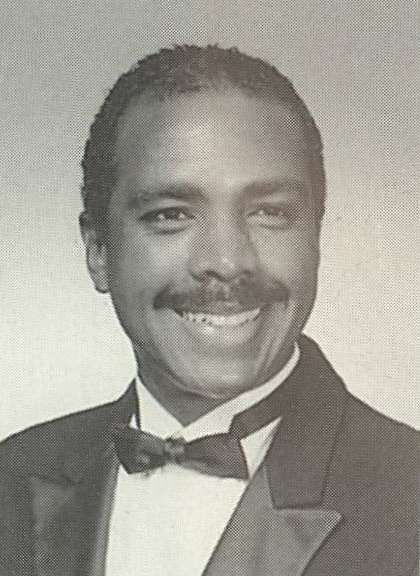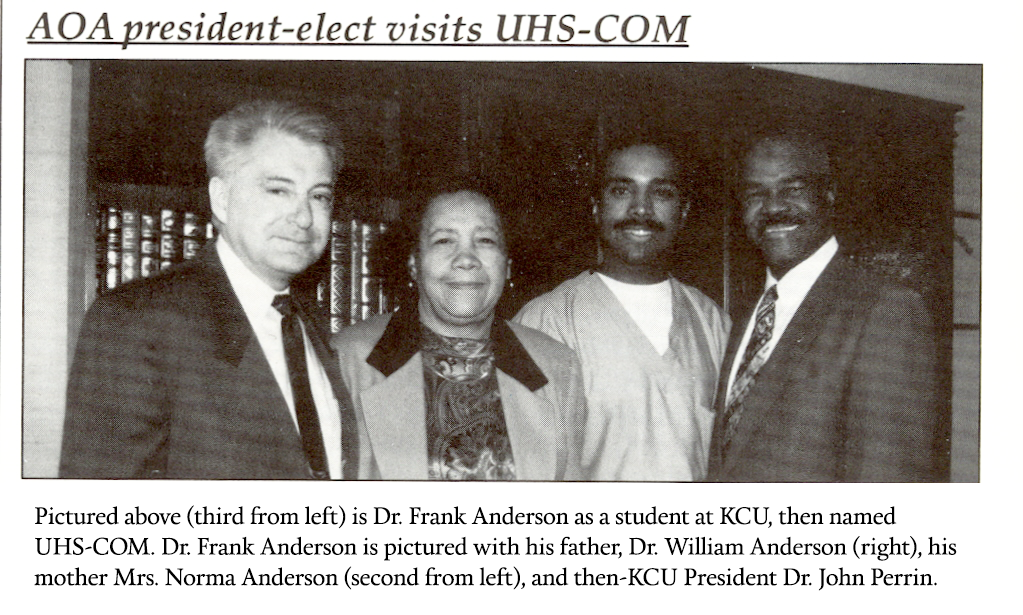Lifetime Pursuits

Dr. Anderson was surrounded by a family of ambitious, accomplished medical professionals. His father, Dr. William G. Anderson, DO, well-known in the osteopathic community, was the first African American man to serve on the board of the American Osteopathic Association (AOA) and was regarded as a distinguished leader in the civil rights movement. His sister, Darnita Anderson Hill, DO, authored a book, “Blacks in Osteopathic Medicine: An Idea Whose Time Has Come.”
“There was no shortage of powerful and motivating influences at every juncture in my life,” Dr. Anderson says, noting that his father often hosted Baptist ministers and activists Dr. Martin Luther King Jr. and Ralph D. Abernathy at his family’s home where, as a youngster, he was exposed to passionate discussions about racial inequities and social justice that would later impact his work. “There are more than ten people in my immediate and extended family—father, sister, brother, nephew, nieces, cousins, brother-in-law—who are physicians. I was knee-deep in medicine long before I decided to become part of that legacy.”
Anderson ultimately chose an eclectic pathway to medicine, applying his chemistry and math background from the undergraduate degree he earned at the University of Michigan in seemingly disparate jobs: a microbiologist for the State of Michigan, a COO for two locations of a family business, running financial spreadsheets for a commercial real estate firm; and work as a pharmaceutical representative who eventually became frustrated sitting in waiting rooms, waiting to meet with physicians.
After several years in the pharmaceutical industry, and out of pure boredom, Dr. Anderson enrolled in science classes at his local community college and took the MCAT, receiving results three times better than his first score 15 years earlier. Coincidentally his father attended a meeting at Kansas City College of Osteopathic Medicine (KCCOM, now KCU) where he discovered the school had opened 50 additional open slots for medical students.
“He told me on a Thursday, I submitted an application and by Monday they invited me to interview,” Dr. Anderson says. “I immediately found the Kansas City medical school environment to be a refreshing change from the large setting of Michigan’s medical school in Ann Arbor or even Michigan State University in Lansing, where there too many distractions for someone like me. There were dedicated teachers. My student cohort was a group of talented and bright professionals and there was a distinct sense of camaraderie on the campus and in the classroom. I value the mentors I had during my experience and am still in contact with numerous classmates. KCU is a good school with a good reputation and many AOA presidents are alumni.”
Finding passion, purpose and a way forward

Now, a quarter century after graduating from KCU and embarking on a career as an OB-GYN, Dr. Anderson reflects on the benefits of becoming a DO later in life, acknowledging that he did things “a bit backward as opposed to a traditional student whose trajectory was more by the books.”
“By the time I got to medical school, it was my entire focus,” he explains. “I had gotten married, had a child, traveled, owned a business, was in business, worked in several sectors. As a newly minted physician, my goal solidified: to draw on what I learned from and what my father modeled - to serve in underserved areas and communities of color where there was disproportionate access to health care. Although colleagues warned against it, I gave my personal number to patients, allowing them to have unfettered access to me. It was an opportunity to do something for a population that didn’t expect it and has made practicing medicine and interacting with patients very rewarding over the years.”
As a child growing up in Albany, Georgia, Dr. Anderson’s critical thinking as an adult about systems, change and efforts to improve health was shaped by his father’s tireless work with Dr. Martin Luther King Jr. and Ralph Abernathy. The elder Anderson, who graduated in 1956 from the Des Moines Still College of Osteopathy and Surgery, founded the Albany Movement, a coalition of activists including the two iconic civil rights leaders, that led to the desegregation of public facilities in Albany. He continues to teach at Michigan State University’s College of Osteopathic Medicine and has a scholarship, the William G. Anderson, DO, Minority Scholarship, through the AOA. In 2021, KCU Student Brandon Bishop was a recipient of the scholarship.
“My father and my family gave me the opportunity to grow, learn and explore,” says Dr. Anderson, “providing an important foundation for cultivating a successful career in medicine.”
Currently a traveling OB-GYN hospitalist based in Las Vegas where he has resided for more than 20 years, Dr. Anderson is concerned that there still aren’t a lot of Black men in the DO profession, leading him to strive to be "ten times better, just to be accepted. Oddly enough, I’ve ignored much of the racism I’ve encountered as a Black DO on so many levels—at some point it became a regular part of life.”
Acknowledging that the country is in a pivotal moment to examine racial injustice in all areas of society—including health care, where disparities became even more apparent during the pandemic—Dr. Anderson looks forward to the day when there are more Black physicians and underrepresented minority physicians in general and when care decisions are made based on what’s best for the patient and not on cost.
“It’s important that KCU is making strides in addressing inequities,” he says, citing the appointment of Associate Provost for Diversity and Inclusion Dr. Kenneth Durgans. “I believe we all need to challenge ourselves as to how we can individually effect change for the most vulnerable in American health care.”